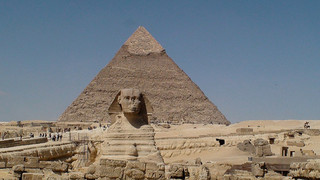 MEDIA ROOTS — Graham Hancock, arguably the world’s foremost expert on ancient mysteries, has devoted his life to uncovering and demystifying the rituals, legends, and wisdom of ancient cultures. In this video, he investigates oft-ignored inconsistencies. For example, he discusses the true age of the Great Sphinx of Giza, which remains under debate. Scholars’ estimates vary widely, though mainstream Egyptologists generally believe it was constructed approximately 4,500 years ago, whereas Hancock asserts heavy water erosion indicates the Sphinx was built quite earlier than believed, at a time when the Giza Plateau wasn’t even a desert yet.
MEDIA ROOTS — Graham Hancock, arguably the world’s foremost expert on ancient mysteries, has devoted his life to uncovering and demystifying the rituals, legends, and wisdom of ancient cultures. In this video, he investigates oft-ignored inconsistencies. For example, he discusses the true age of the Great Sphinx of Giza, which remains under debate. Scholars’ estimates vary widely, though mainstream Egyptologists generally believe it was constructed approximately 4,500 years ago, whereas Hancock asserts heavy water erosion indicates the Sphinx was built quite earlier than believed, at a time when the Giza Plateau wasn’t even a desert yet.
Hancock also questions how Egyptian culture could have attained, such an advanced state so quickly. As he explains, cultures generally undergo evolutionary processes before reaching a point of historic greatness or iconic status. There is usually a progression, in which the building blocks of a society are gradually created over time, giving rise to increased sophistication as the civilization matures. However, with ancient Egypt this does not seem to be the case. Egypt seemingly appeared out of nowhere, complete with massive, architectural wonders, a complex mythology, and an eerily accurate astronomy. Yet, no concrete evidence links Egypt to a previous culture. So, where did ancient Egyptians develop their wisdom? Or should we be asking: Where did the Egyptians come from?
In the video, Hancock lays out a fascinating theory. He believes an ancient culture existed far earlier than contemporary scientists believe, which laid the foundation for Egyptian civilization. He suggests around the end of the last ice age, approximately 10,500 BCE, a cataclysmic natural disaster altered the course of mankind by disrupting this ancient culture. Because most people at this time were living close to water, flooding from the disaster killed the vast majority of them. However, the small minority, which survived retained the wisdom of their antecedents.
Who were these people? Hancock believes they were from Atlantis, the mythical lost island, which most scholars have concluded to be non-existent. For example, Alex Cameron wrote in Greek Mythography in the Roman World (124), “It is only in modern times that people have taken the Atlantis story seriously; no one did so in antiquity.”
Hancock also investigates a number of other ancient artifacts, mysterious discoveries, and cultural anomalies. With cultivated elocution and an erudite demeanor, Hancock tempers his non-traditional theories with cool, detached logic and reasoning. Whether one’s persuaded by him or not, one can’t deny his ability to bring excitement and attention to the study of ancient cultures. For example, Hancock tells us ancient cultures were much more in tune with nature, astronomy, and the Earth itself, all of which helped shape their worldview. Consequently, their wisdom and spirituality was much deeper and more encompassing than modern cultures. In fact, Hancock’s theories may cause you to wonder whether humanity has progressed at all since the time of the ancients.
Written by Adam Miezio
Edited by Alex Starace
***
***
Photo by Flickr user S W Ellis











I have believed for a long time that the knowledge we have now comes from the past.when you think that two decades ago scientists believe that mankind evolved over a period of roughly 500,000 years we are now finding evidence that puts the development of man over 3 million years and more. we have found a computer over 2,000 years old.
we are finding artifacts that have been carbon dated so far back that scientists dont believe there own findings because it doesent fit in with modern day beliefs.
What a load of shit.
He is right! I just wish we could make a definitive discovery that would prove it. I know in my heart were we really come from and I hope one day before I die it is truly discovered.
Awesome video! Thank you so much! I absolutely loved “Entangled” and can’t wait for the sequel. . . There is going to be a sequel soon. . .
For ancient weirdness read:
The Ultimate Frontier by Eklal Kueshana